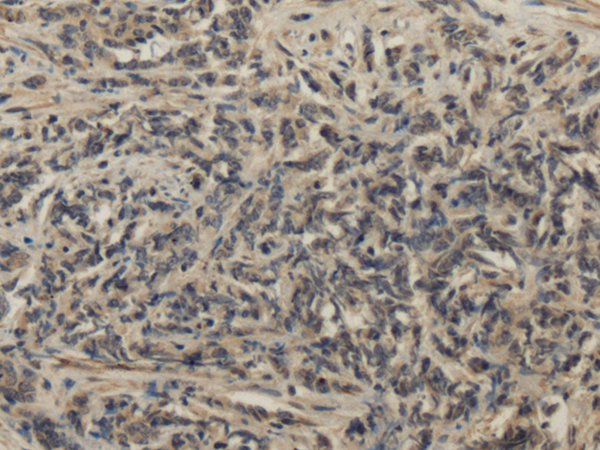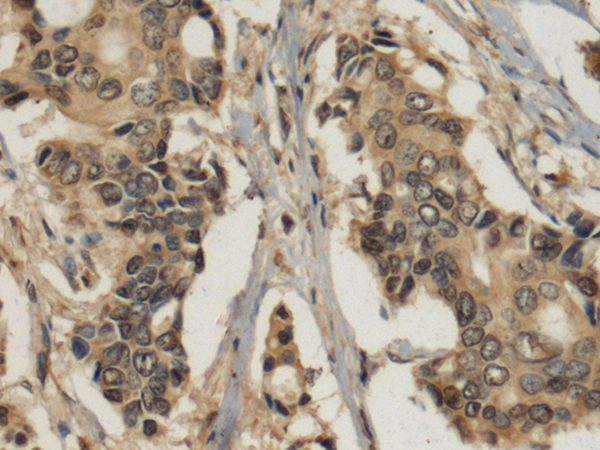

| WB | 咨询技术 | Human,Mouse,Rat |
| IF | 咨询技术 | Human,Mouse,Rat |
| IHC | 1/100-1/300 | Human,Mouse,Rat |
| ICC | 技术咨询 | Human,Mouse,Rat |
| FCM | 咨询技术 | Human,Mouse,Rat |
| Elisa | 1/5000-1/10000 | Human,Mouse,Rat |
| Aliases | L9; ENH; LIM; ENH1 |
| Host/Isotype | Rabbit IgG |
| Antibody Type | Primary antibody |
| Storage | Store at 4°C short term. Aliquot and store at -20°C long term. Avoid freeze/thaw cycles. |
| Species Reactivity | Human, Mouse, Rat |
| Immunogen | Fusion protein of human PDLIM5 |
| Formulation | Purified antibody in PBS with 0.05% sodium azide and 50% glycerol. |
+ +
以下是3篇涉及PDLIM5抗体的代表性文献摘要:
---
1. **文献名称**:PDLIM5 in bipolar disorder: a susceptibility gene?
**作者**:Hattori E. et al.
**摘要**:该研究通过免疫印迹和免疫组化实验,利用PDLIM5抗体检测其在人脑组织中的表达,发现PDLIM5基因多态性与双相情感障碍相关,可能通过影响神经元突触功能参与疾病机制。
---
2. **文献名称**:PDLIM5 regulates cell proliferation and invasion in breast cancer
**作者**:Wang Y. et al.
**摘要**:研究采用PDLIM5特异性抗体进行免疫荧光染色和Western blot分析,发现PDLIM5在乳腺癌中高表达,通过调控Wnt/β-catenin通路促进肿瘤细胞增殖和转移。
---
3. **文献名称**:The role of PDLIM5 in cardiac myocyte structural organization
**作者**:Boateng S.Y. & Goldspink P.H.
**摘要**:通过免疫共沉淀和共聚焦显微镜技术结合PDLIM5抗体,研究发现PDLIM5在心肌细胞中与肌节蛋白结合,参与细胞骨架动态调节及机械应力响应。
---
注:实际文献需通过PubMed或Google Scholar检索确认。若需具体DOI或补充文献,可进一步说明。
The PDLIM5 antibody is a research tool designed to detect and study the protein PDZ and LIM domain protein 5 (PDLIM5), also known as enigma homolog (ENH). PDLIM5 belongs to the PDZ-LIM protein family, characterized by a PDZ domain at the N-terminus and one or more LIM domains at the C-terminus. These domains mediate protein-protein interactions, enabling PDLIM5 to act as a scaffolding molecule in cellular signaling pathways. It plays roles in cytoskeletal organization, intracellular signaling, and transcriptional regulation, particularly in the nervous system and cardiac tissue.
PDLIM5 has been implicated in neuropsychiatric disorders, such as schizophrenia and bipolar disorder, as well as in cancer progression and cardiovascular diseases. Studies suggest it interacts with receptors, ion channels, and kinases, influencing pathways like the cAMP/PKA and Wnt/β-catenin cascades. Dysregulation of PDLIM5 expression has been observed in these pathologies, making it a biomarker of interest.
The PDLIM5 antibody is widely used in techniques like Western blotting, immunohistochemistry, and immunofluorescence to investigate its expression, localization, and function in tissues or cell lines. Its specificity and validation are critical for interpreting experimental outcomes, given the protein’s structural complexity and tissue-specific isoforms. Research utilizing this antibody continues to clarify PDLIM5’s role in disease mechanisms and its potential as a therapeutic target.
×